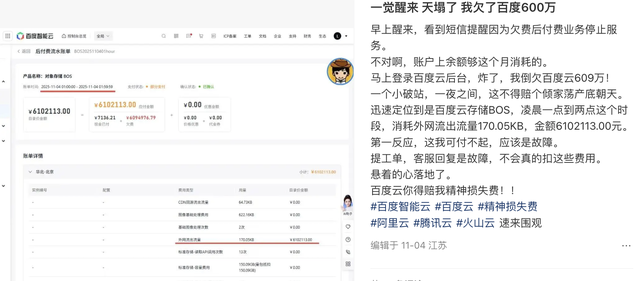A Billion-Yuan Bill: Baidu Intelligent Cloud Grapples with Dual Challenges of Technology and Security
![]() 11/14 2025
11/14 2025
![]() 528
528

As the global economy undergoes an accelerated digital transformation, intelligent cloud computing, acting as the 'cornerstone of computing power,' perfectly aligns with the explosive growth in data demands characteristic of the digital economy. It has emerged as the fastest-growing sector and a focal point of competition among leading vendors and nations worldwide. On the global stage, foreign vendors such as AWS, Microsoft Azure, and Google Cloud currently hold sway, while domestic players like Baidu Cloud, Alibaba Cloud, Huawei Cloud, and Oracle Cloud are swiftly catching up in niche markets.
In recent public statements, Shen Dou, the head of Baidu's Intelligent Cloud Business Group (ACG), has articulated a commitment to long-term strategic deployment, aiming to provide robust and cost-effective AI computing power to facilitate the internalization of AI capabilities within enterprises.
Shen has repeatedly underscored the significance of 'intelligence.' However, Zhang Yunjing, a small business owner who has utilized Baidu Intelligent Cloud for five years, has cautioned against hasty cloud adoption. He recounted a harrowing experience on November 4 when his backend displayed a download traffic charge of 250KB that amounted to over 20 million yuan, with the bill status marked as 'confirmed.' He promptly sought clarification overnight.
Zhang discovered that numerous peers had encountered similarly exorbitant and absurd bills: one website owner was presented with over 45.16 million yuan in arrears, accompanied by warnings of service suspension and data deletion after 15 days; another user faced a 6 million yuan charge for 170.05KB of external traffic and a 90,000 yuan deduction for 7.19MB of traffic. Some accounts even displayed arrears as high as 100 million yuan.

Faced with these concentrated issues, Baidu Intelligent Cloud promptly issued a statement attributing the anomalies to a financial system upgrade and noting that abnormal billing data was undergoing rectification. Many users subsequently reported that the erroneous bills had been corrected, and the issue was gradually resolved.
Despite the swift official response, the incident has raised concerns among users like Zhang regarding the reliability of cloud billing systems, particularly for small companies that are vulnerable to such financial shocks.
Other observers have noted that while the absurdly high anomaly amounts made detection easier, minor unauthorized charges might go unnoticed by average users, exposing significant management and technical flaws in Baidu Intelligent Cloud's financial billing testing and verification processes.
While cloud products undoubtedly enhance work efficiency, inadequate data security can transform them into high-risk leakage points, sounding another alarm for both cloud vendors and users.
The Booming 'Cloud' Harvest
Domestic intelligent cloud vendors can be broadly categorized into two camps: internet giants (Alibaba Cloud, Tencent Cloud, Huawei Cloud, Baidu Intelligent Cloud) and telecom operators (China Telecom Cloud, China Mobile Cloud, China Unicom Cloud).
Among the internet players, Tencent embarked on its cloud journey early, leveraging operational needs from QQ and QQ Space (1999–2010) to accumulate cloud technology experience. It formally launched CDN and other cloud services in 2010, opened core services like cloud security to the public in 2013, and established Tencent Cloud Computing Co., Ltd. in 2014, accelerating its cloud expansion.
Under Jack Ma's vision, Alibaba founded Alibaba Cloud in 2009, developing the distributed operating system 'Apsara.' It upgraded to Alibaba Cloud Intelligence in 2018, integrating cloud and AI capabilities to enhance its service offerings.
Huawei established its Cloud Services Department in 2011, initially targeting enterprise markets in 2015 with products like Elastic Cloud Servers and Object Storage. It formally launched Huawei Cloud in 2017 to enter the public cloud market and compete on a broader scale.
Industry insiders often describe Baidu Intelligent Cloud as 'starting early but arriving late,' with internal project approvals predating those of Alibaba and Tencent but lacking sustained investment to capitalize on its early lead.
Regardless of timing, Baidu Cloud is widely perceived to have officially commenced its cloud journey with Li Yanhong's 2012 keynote at the Baidu World Conference, 'The Cloud Empowers You, Innovates the Future.' During this event, he announced core cloud capabilities like cloud storage, big data intelligence, and cloud computing to reduce costs for developers. In 2015, Baidu Open Cloud formally launched (serving as the precursor to Baidu Intelligent Cloud), initially shaping its 'cloud-intelligence integration' model. Formal efforts began in earnest in 2016, with 'Baidu Cloud' upgraded to 'Baidu Intelligent Cloud' in 2019, unveiling 14 new products to bolster its market presence.
Baidu Intelligent Cloud gained strategic prominence in May 2022 when Shen Dou received his second major KPI assignment at Baidu: leading the Intelligent Cloud division. Previously, his public image was primarily centered on framing Baidu's search business through the 'X+Y' strategy.
With advertising growth stagnating, Baidu sought to break through its search ceiling, positioning intelligent cloud as a 'second growth engine' to diversify its revenue streams.
Coinciding with the AI boom, Baidu differentiated itself with an 'AI-native' approach, carving out a unique market path that leveraged its strengths in artificial intelligence.
Baidu Intelligent Cloud delivered strong results, with 2025 earnings showing AI-related revenue (including cloud services) exceeding 10 billion yuan for the first time, marking a 36% year-on-year increase in the first half. Intelligent cloud revenue rose 27% to 6.5 billion yuan, underscoring its growing contribution to Baidu's overall financial performance.
Citing IDC data, Baidu claimed a 24.6% market share, topping China's AI public cloud services market for six consecutive years. Notably, Alibaba Cloud tied for first place in the same report, highlighting the intense competition in this sector.
The Dual Hurdles of Low Pricing and Ecosystem
Behind the booming facade, Baidu Intelligent Cloud has not fully escaped the 'AI hype without profitability' dilemma. It remains a smaller contributor to Baidu's overall revenue and struggles to overcome low pricing and ecosystem challenges to swiftly support Baidu's performance objectives.
Breaking down intelligent cloud services into IaaS (infrastructure), PaaS (platform), and MaaS (model application) layers, IaaS dominates domestic cloud revenue as SMEs prioritize basic IT needs. In 2024, Alibaba Cloud led China's public cloud IaaS market with a 36.7% share, followed by Tencent Cloud (17.8%), while Baidu Intelligent Cloud held just 8.1%. This reflects Baidu's strategic focus on PaaS+SaaS layers, where its AI technologies excel and offer a competitive edge.
Omdia's 'China AI Cloud Market, 1H25' report, using 'IaaS+PaaS+MaaS' revenue as a metric, ranked the top five AI cloud vendors for the first half of 2025: Alibaba Cloud (35.8%), Volcano Engine (14.8%), Huawei Cloud (13.1%), Tencent Cloud (7%), and Baidu Cloud (6%). This indicates that Baidu has not yet reached top-tier status domestically, despite its strong AI focus.
Baidu's rapid growth in the cloud market has been fueled by aggressive pricing strategies. Third-party models on its Qianfan platform were priced at 50% (DeepSeek-R1) and 30% (DeepSeek-V3) of official rates in 2025, setting a new benchmark for affordability. Its self-developed Qianfan large models established industry lows, with 100 million Tokens priced at 20 yuan during the 2025 Double 11 sale. Earlier this year, Baidu made its Wenxin Yiyan large model freely available, while last year, its basic RDS MySQL and Redis cloud database packages were priced significantly below those of Alibaba, Tencent, and Huawei.
However, low pricing has sparked controversy within the industry. In February, Shen Dou criticized peers like Doubao for high training and marketing costs, arguing that China's 'malicious price war' in large models has depressed industry revenue compared to global peers. Volcano Engine President Tan Dai countered that Doubao's training costs were significantly lower than domestic rivals, maintaining healthy margins and challenging Shen's assertions.
Virtually all Chinese cloud vendors, including Baidu, have engaged in price wars to gain market share, making it difficult to assign blame for the prevailing competitive environment. Shen's remarks were seen as a reflection of Baidu Intelligent Cloud's profitability pressures and the challenges it faces in maintaining a sustainable business model amid intense competition.
Compared to Alibaba, Tencent, and Huawei, Baidu's weaknesses lie in ecosystem and channel development. While Alibaba leverages diverse internal businesses (e-commerce, logistics) and rapid solution deployment via 'Cloud + DingTalk,' Baidu lacks prominence in e-commerce, livestreaming, or finance. Its search and AI strengths face stiff competition, forcing intelligent cloud to rely on technical appeal, which often struggles to penetrate traditional enterprises that may be more risk-averse or less technologically savvy.
Client structure is another area of weakness for Baidu. Its clients are heavily concentrated in autonomous driving and manufacturing sectors, lacking the industry-wide coverage enjoyed by Alibaba and Huawei. This concentration results in weaker risk resistance, as slow growth in dependent sectors directly impacts Baidu's business performance. Additionally, heavy R&D and infrastructure investments, coupled with low-price strategies, trap Baidu in a cycle of high costs and prolonged profitability challenges, obscuring a clear path to stable earnings and sustainable growth.
Regaining Trust, Restoring Growth
A more enduring challenge for Baidu Intelligent Cloud is rebuilding its brand image and user trust, which have been eroded by recent controversies.
Baidu has invested heavily in R&D to cultivate technical advantages and repair its reputation. However, 2025 saw data security controversies involving a vice president and the billion-yuan billing anomaly, further eroding user confidence in its management and technology capabilities and damaging the brand's credibility.
At the World 2025 Conference, Li Yanhong showcased three significant achievements in Wenxin large models, Kunlun Core chips, and Apollo Go (autonomous driving), underscoring Baidu's long-term commitment to AI development and innovation.
Regarding search, Li claimed that Baidu leads global search engines in AI transformation: 'We've rebuilt search results with AI, shifting from text- and link-centric pages to rich media (images, videos)-driven AI applications that offer more intuitive and engaging user experiences.'
Whether users will fully embrace AI-wrapped text answers remains to be seen, as it represents a fundamental shift in how information is presented and consumed.
Baidu also announced the platformization of 'Luo Yonghao'-style high-persuasion digital human technology for industry-wide use, aiming to revolutionize customer interactions and marketing strategies. However, a live demo faltered when staff lost real-time interaction with the 'digital Luo Yonghao,' leading to a black screen. After repeated failed attempts to restore the connection, the presentation ended with, 'We'll leave this as a suspense (cliffhanger) for you to explore later,' leaving audiences with mixed impressions.
For Baidu Intelligent Cloud and the broader Baidu Group to thrive in the competitive cloud market, they must address profitability challenges while adopting a more prudent and strategic approach to business expansion and innovation.







